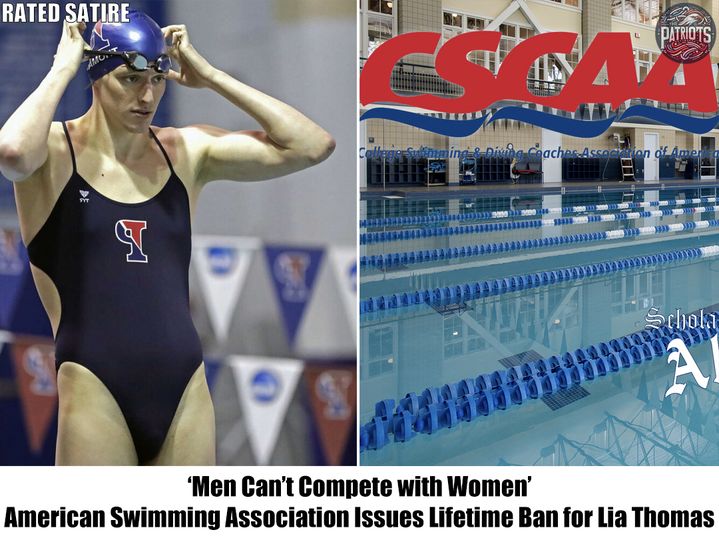
In an unprecedented move that no one saw coming (or maybe everyone did, depending on which social media echo chamber you inhabit), the American Swimming Association (ASA) has issued a lifetime ban for Lia Thomas. Their explanation? The eloquent and irrefutable “Men can’t compete with women.” And just like that, the ASA has single-handedly solved the age-old debate of gender and sports. Why didn’t we think of that?
In a press release typed in Comic Sans font and adorned with clip art of ’90s-era swimming goggles, the ASA cited their newfound expertise in genetics, sociology, and ethics. “After months of watching YouTube videos and scrolling through angry tweets, we have come to the informed conclusion,” the release stated. It’s good to see that the Association is relying on rigorous scientific methods.
Let’s not forget Lia Thomas, who woke up a regular swimmer and is now likely to become a question in your next pub trivia. “Who was the swimmer banned for life by the ASA in a groundbreaking move that was in no way controversial?” The answer, dear quiz-takers, is not Michael Phelps.
According to unnamed sources (Bob from accounting and Karen from HR), the ASA convened a top-secret panel of “experts” to discuss the Lia Thomas situation. Rumor has it these included a PE teacher who once watched a documentary on fish, a lifeguard who insists he has X-ray vision, and a tarot card reader. With a panel like that, what could possibly go wrong?
And their conclusion? Men’s physiological attributes—like the ability to open tightly-sealed jars and reach high shelves—are just unfair advantages in women’s swimming. They were close to suggesting separate pools for men and women but decided that might be too radical.
Following the announcement, Twitter predictably exploded, taking down three servers and causing an unexpected spike in popcorn sales. While some applauded the ASA’s brave move into the 19th century, others questioned the Association’s understanding of, well, everything.
An anonymous international swimmer said, “Well, now I know where not to compete.” Meanwhile, European Swimming League’s official statement was just an emoji of a facepalm.
While the world remains divided on buttered vs. sweet popcorn, there’s no denying the larger implications of the ban. It’s not just about swimming or Lia Thomas. It’s about transgender rights, inclusivity, and understanding.
By pushing Thomas into the media maelstrom, the ASA has also unintentionally highlighted a vital need for proper education and understanding about transgender issues. But given their reliance on YouTube for research, the hope for such understanding seems like waiting for a cat to win the Olympic 100m butterfly.
In the aftermath of the ban, it’s worth pondering: what’s next for the world of swimming? With the ASA at the helm, we can expect some radical changes. Proposals allegedly include:
A separate category for people who’ve eaten within 30 minutes of swimming—because we all know that’s just plain dangerous.
Mandatory floaties for anyone who can’t prove they’ve been to the deep end and back.
A ban on butterfly stroke, not due to any gender issues, but just because it looks weird.
It’s clear that the ASA’s decision to ban Lia Thomas is layered, deep, and more complicated than trying to explain the offside rule to your grandmother. While the world might be divided on the decision, we can all agree on one thing: It’s a great time to be in the popcorn business.
In all seriousness, the Lia Thomas saga underscores a bigger conversation we need to have about sports, inclusivity, and how we define fairness. But until we can have that discussion with nuance and empathy, we’ll continue to paddle in circles.


